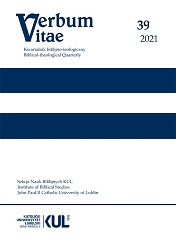The Term ἀντίψυχος as an Expiatory Sacrifice of Martyrs in the Light of The Fourth Book of Maccabees and Other Ancient Extra-Biblical Literature
The Term ἀντίψυχος as an Expiatory Sacrifice of Martyrs in the Light of The Fourth Book of Maccabees and Other Ancient Extra-Biblical Literature
Author(s): Marcin ChrostowskiSubject(s): Theology and Religion
Published by: Katolicki Uniwersytet Lubelski Jana Pawła II - Wydział Teologii
Keywords: The Fourth Book of Maccabees; 4 Macc; ἀντίψυχος; expiatory martyrdom; reparation; sacrifice; atonement
Summary/Abstract: The Fourth Book of Maccabees (4 Macc) in the description of Eleazar's prayer, before he suffered a martyr’s death (6:29) as well as the martyrdom of seven brothers and their mother who suffered for the nation (17:21), the term ἀντίψυχος (which means “given in exchange for life”) is used twice. This adjective appears only twice in the Septuagint (LXX), to be precise, in 4 Macc The context of both passages suggests a broader meaning of the term, translated with reference to a sacrifice of life having a propitiatory, expiatory, vicarious and voluntary character, and even atonement for the sins of the Jewish people. In this article, the subject of expiatory martyrdom in 4 Macc will be taken in the context of the biblical, apocryphal and other ancient texts, with reference to the flow of ideas and terminology of Greco-Roman religion, poetry and philosophy. In addition, possible translations of the term ἀντίψυχος will be analyzed, included in the broader context of Greek and other terminologies, so as to show possible connections between the idea of expiatory martyrdom and the ideas described in the New Testament.
Journal: Verbum Vitae
- Issue Year: 39/2021
- Issue No: 3
- Page Range: 725-748
- Page Count: 23
- Language: English

